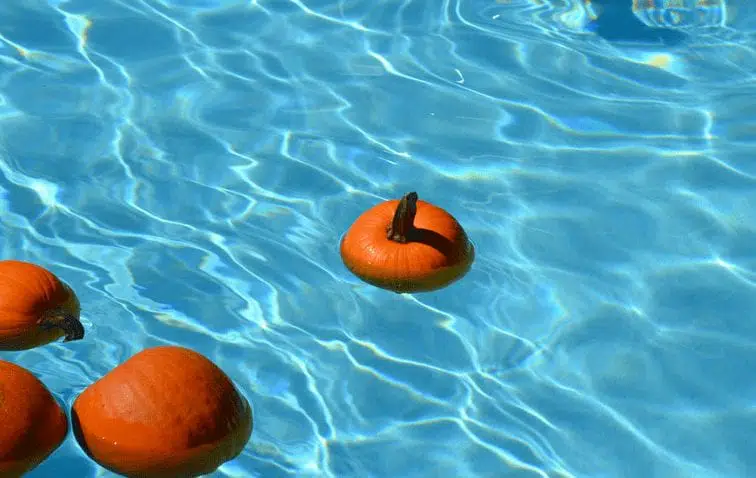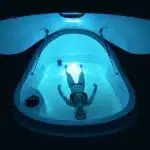The weather cools down, lines at Party City reach an all-time high, pumpkins magically appear at every establishment, and the USA seems focused on the famous line “Trick or Treat!” While there are ideally more treats given than tricks played this month, we are focusing in October on the Tricks and Treats of Floating! To many who have never floated, it may seem like a trick to hear that flotation therapy can be the solution to a variety of ailments, but it should be accepted as a treat to know that every one sixty minute session can have such positive effects on a variety of mental and physical conditions.
There are many ideas for how to combat anxiety such as therapy, exercise, medication and so forth.
A newly researched phenomenon is using floating as a tool to help with anxiety. Dr. Feinstein, a clinical neuropsychologist and advocate of flotation therapy, has researched a significant amount on the “treats” of floating. “One of Feinstein’s pilot studies, which is currently under review for publication, found that in 50 individuals with anxiety, all showed measurable signs of relaxation including lowered blood pressure, lowered activity in the brain, and significantly reduced symptoms of anxiety. Feinstein has found that some of these effects can last over 24 hours.” How does flotation therapy achieve this? A 60 minute float session can lower cortisol, lower blood pressure, and it is a catharsis of stressful thoughts. Flotation therapy is considered a natural remedy to help with anxiety. You can read more about this study in an earlier True REST blog post.
Another trick of floating is the benefits it offers in conjunction with acupuncture.
“Flotation therapy and acupuncture complement each other. Many partake in both, as part of a personal wellness strategy to combat the effects and pressures of modern day society. For this reason, many acupuncturists recommend floatation therapy to their patients.” Acupuncturist Justine Wenger has recommended floating for her clients, specifically she educated a client that “floating would help treat [her] lower back pain- it decompresses and realigns the spine and helps relax back muscles”. By combining the age-old method of acupuncture with the natural benefits of floating, clients can feel relaxed and pain free.
A common recommendation for people who suffer from migraines is to help treat the pain with increased magnesium. In a float pod there are 1000 pounds of Epson salt which is a form of magnesium.
The Migraine Girl, Janet Geddis, hypothesizes that regarding the benefits of floating for migraines that she’d, “venture to guess that the migraine brain, so used to feeling attacked by stimuli, would bask in a sensory-free environment for a couple of hours.” The Migraine Girl describes her experience in the pod and explains that she, “left feeling more calm. My body felt the way it does after a really great massage or a fabulously relaxing yoga class—I was energetic but calm, and my muscles hummed and I was pain-free”.
“While increasing your magnesium levels, Epsom Salt also delivers sulfates, which are extremely difficult to get through food but which readily absorb through the skin.”
Need a trick to retain information better? The treats of Floating could be the solution to learning a new language.
“Nowadays there are many accelerated-learning language programmes, which consider learning 80-100 new words a day a great success. However, Bulgarian psychiatrist and educator Georgi Lozanov has developed a technique, which far surpasses these figures. His method aims to synchronize mind and body rhythms by entering a state of deep relaxation with the goal of encouraging hemispheric cooperation in the brain. This enables a vastly more receptive state of mind and can really supercharge your learning.
Floating, and the relaxed state of mind that it brings on, is very much in line with Lozanov’s work and the effects of using this technique are astonishing. Lozanov’s subjects have been able to learn and retain up to 3000 words per day!”
While floating can help with general studying it has also found success in a crucial aspect of the military- learning language for new environments,
“It’s essential that they understand solidly the language of the territories they’re about to enter so they can engage with locals, they can engage with allies, they can do what needs to be done. In the past that’s been a minimum of a six-month cycle time. So you take highly trained operators and you have them sitting on the bench learning a foreign language before being deployed that’s incredibly inefficient.
By combining these deprivation tanks with next generation biofeedback these guys have been able to reduce a six-month cycle time in learning a foreign language down to six-weeks. So that’s basically cutting it into a quarter and that is just by, same people, same body same brains, but just optimizing where they are to receive and learn and retain new content.”
The exciting research of flotation therapy expands daily across the world. What tricks or treats do you experience with flotation therapy?






